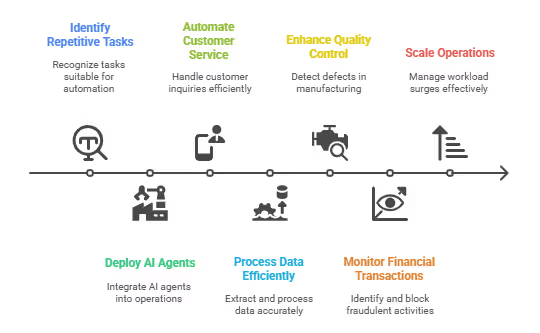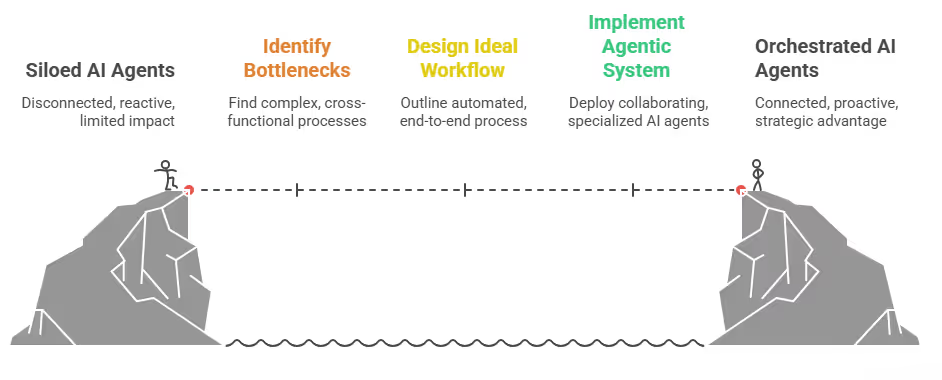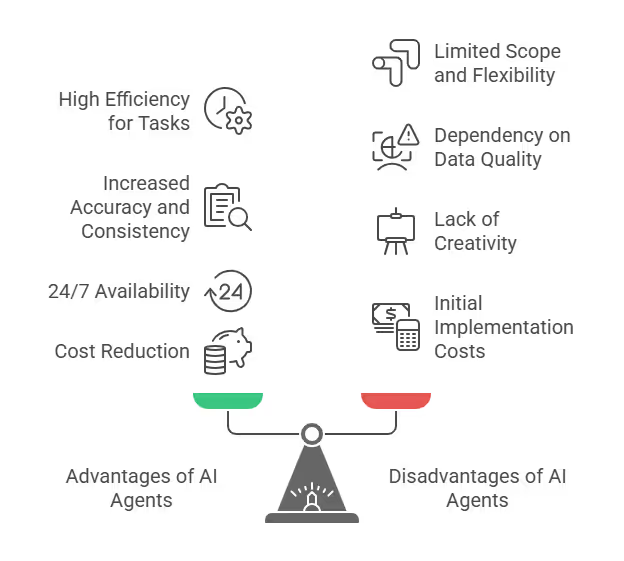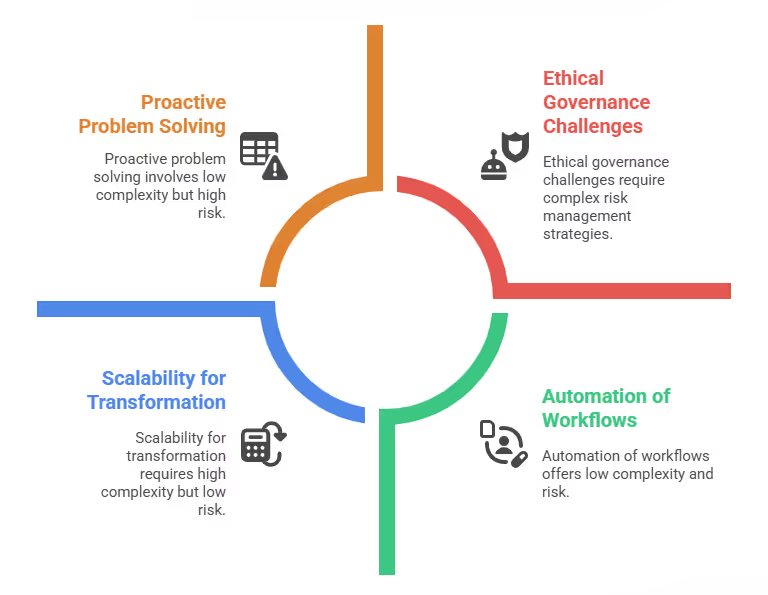AI Agents vs. Agentic AI: Unlocking US Enterprise Growth

AI Agents vs. Agentic AI: Your Blueprint for US Business Success in 2025
Table of Contents
- Why AI Agents? The Power of Precision for American Businesses
- Common AI Agent Applications in American Businesses
- Why Agentic AI? Orchestrating Intelligence for Strategic Advantage in the USA
- Real-World Impact: Agentic AI in Action Across American Industries
- Advantages and Disadvantages of AI Agents for American Businesses
- Advantages and Disadvantages of Agentic AI for American Enterprises
- Navigating the Challenges: The Road to Agentic AI Adoption in the U.S.
- People Also Ask: AI Agents vs. Agentic AI
- Comparing AI Agent Frameworks for U.S. Enterprises (2025)
The question isn't if artificial intelligence will transform your American business, but how fast and how effectively you'll adapt.
In 2024, 78% of U.S. enterprises were already using AI in at least one business function, a significant leap from 55% just two years prior, according to research by McKinsey & Company. Yet, many executives we speak with at our AI development company, headquartered in San Francisco, struggle with the nuances of advanced AI.
They often ask: "What's the real difference between an 'AI agent' and 'agentic AI,' and how can my company, whether in bustling New York or the quiet Midwest, leverage these for tangible results?"
This isn't just academic jargon. Over the past six years, our firm has directly guided over 75 U.S. clients, from large pharmaceutical companies in New Jersey to innovative retail startups in Texas, to deploy AI solutions that have driven average productivity gains of 40% in complex workflows and reduced operational costs by up to 30%.
AI agents are individual, task-focused intelligent programs, while agentic AI refers to a sophisticated system where multiple AI agents collaborate autonomously to achieve complex, long-term business goals.
Why AI Agents? The Power of Precision for American Businesses

Automating the Mundane for Efficiency
AI agents excel at taking over predictable, high-volume tasks that traditionally consume significant human hours.
This frees up your valuable American workforce for more strategic work.
- Customer Service. Leading U.S. telecommunications giants like Verizon and AT&T deploy AI agents to handle over 70% of inbound customer service inquiries. These agents, like the one handling password resets for a major regional bank in the Midwest (serving 1.5 million customers), can instantly verify identity, troubleshoot common issues, and even process basic transactions 24/7. This reduces average call times by 40 seconds, saving the bank an estimated $1.2 million annually in operational expenditure.
- Data Entry & Processing. A large healthcare provider in Texas, managing over 5 million patient records, uses AI agents to automate data extraction from medical documents. This has reduced manual data entry errors by 85% and accelerated processing time by 50%, ensuring faster patient care and improved billing accuracy.
Driving Consistency and Reducing Errors
Human error is inevitable. AI agents execute tasks with machine-like precision, ensuring consistent quality and compliance across your operations.
- Quality Control in Manufacturing. At a Ford Motor Company plant in Michigan, AI agents analyze images of car parts on the assembly line. These agents detect microscopic defects that human eyes might miss, identifying anomalies with 99.8% accuracy. This proactive approach has reduced product recalls related to component flaws by 15% in the last fiscal year, saving millions in warranty claims.
- Financial Transaction Monitoring. A top-tier investment bank in New York City employs AI agents to monitor millions of financial transactions daily. These agents identify suspicious patterns indicative of fraud with an 80% higher detection rate than previous rule-based systems, blocking an average of $5 million in fraudulent transactions each month.
Common AI Agent Applications in American Businesses
AI agents are not futuristic concepts; they are already deeply embedded, driving real value across various sectors in the United States.
Our experience working with businesses from Silicon Valley to Boston shows these agents are critical tools for immediate, tangible improvements.
- Customer Service Bots: Beyond simple FAQs, modern AI agents like Bank of America's "Erica" handled over 1 billion customer interactions by early 2025, resolving issues with a reported 98% issue resolution rate. These agents are critical for 24/7 support and consistent responses.
- Automated Inventory Management: U.S. retailers like Walmart deploy autonomous inventory bots that scan store shelves. These robots monitor stock levels, identify misplaced items, and flag out-of-stock products, improving inventory accuracy by up to 99.9% and ensuring product availability.
- Predictive Maintenance in Manufacturing: Companies like Siemens utilize AI agents in their U.S. industrial operations. These agents monitor sensor data from machinery in real-time. They predict equipment failures with high accuracy, reducing unplanned downtime by 30% and extending machine lifespan.
- Cybersecurity Operations (SecOps) Assistants: In U.S. IT departments, AI agents act as the first line of defense. For example, IBM Watson AIOps agents intelligently filter millions of alerts, reducing false positives by 80% and accelerating incident resolution by 60%, crucial for protecting sensitive corporate data.
- Personalized Content Recommendations: Streaming services like Netflix and e-commerce platforms like Amazon use AI agents to analyze user behavior. These agents recommend movies, shows, or products, driving significant engagement. Amazon's AI-driven recommendation engine, for instance, is reported to account for 35% of its total revenue.
- Automated Document Processing: In legal and financial sectors across the U.S., AI agents parse vast amounts of unstructured text. JPMorgan Chase's COiN platform, for example, uses AI to review commercial loan agreements, a task that once required 360,000 hours of lawyer time annually, now completed in seconds.
These examples clearly demonstrate that AI agents are not merely theoretical; they are practical, implemented solutions delivering measurable returns on investment for American businesses right now.
Why Agentic AI? Orchestrating Intelligence for Strategic Advantage in the USA

Tackling Complex, Multi-Step Business Processes
Agentic AI shines when a business process involves multiple steps, diverse data sources, and dynamic decision points.
- Supply Chain Optimization. A major U.S. logistics provider, managing over 10,000 daily shipments across North America, uses an agentic AI system. This system includes:
- A weather monitoring agent (integrating with National Weather Service data).
- A traffic analysis agent (using real-time data from Google Maps API).
- A fleet management agent (connected to their vehicle telemetry).
- A customer notification agent.If a blizzard in the Rockies disrupts a key trucking route, the agentic system proactively re-routes affected shipments, updates estimated arrival times for customers, and reroutes other vehicles to avoid the area – all without human intervention. This has reduced delivery delays by 22% and cut fuel costs by 8% over the past year.
- Personalized Healthcare Pathways. A large U.S. health insurance company in California is piloting an agentic AI system for chronic disease management. This system coordinates a "team" of agents:
- A data ingestion agent pulls information from patient wearables (Fitbit, Apple Health).
- A health monitoring agent flags anomalies.
- A resource recommendation agent suggests relevant educational content or telehealth consultations.
- A scheduling agent books follow-up appointments with primary care physicians.This cohesive system proactively supports patients, leading to a 10% reduction in emergency room visits for targeted conditions for those enrolled in the program.
Real-World Impact: Agentic AI in Action Across American Industries
The promise of agentic AI is not merely theoretical; it's already creating tangible value for American enterprises across diverse sectors.
These aren't just pilot programs; many are scalable deployments demonstrating significant ROI.
Financial Services: Proactive Risk Management and Personalized Advice
In the highly regulated and data-intensive U.S. financial services industry, agentic AI is revolutionizing operations.
The AI agents market in finance alone is predicted to grow significantly, with a focus on autonomous operations.
- Fraud Detection and Prevention. Beyond simply flagging suspicious transactions, agentic AI systems like those at JPMorgan Chase are now autonomously monitoring transactions in real-time, identifying anomalies with greater accuracy and taking immediate corrective action without human authorization. These systems block fraudulent transactions, request verification, or notify customers instantly, preventing billions in potential losses annually. They can analyze vast datasets, including market news and trading patterns, to identify emerging fraud schemes before they become widespread.
- Personalized Wealth Management. Agentic AI is democratizing wealth management. Firms are deploying systems where agents analyze financial goals, market conditions (integrating with data from sources like Bloomberg or Refinitiv), and personal risk profiles to offer hyper-personalized investment strategies. An agent gathers client data, another analyzes market trends, a third generates personalized recommendations, and a fourth even drafts communication to the client. This level of personalized, always-on advice is transforming how U.S. wealth managers serve their clients.
Healthcare: Revolutionizing Patient Care and Operational Efficiency
The American healthcare system, under immense pressure to improve outcomes and reduce costs, is a prime candidate for agentic AI. The Agentic AI in healthcare market in the U.S. was valued at $538.51 million in 2024 and is projected to grow at a CAGR of 45.56% from 2025 to 2030 according to Grand View Research.
- Clinical Decision Support Systems (CDSS). Hospitals like Mass General Brigham are leveraging agentic AI to assist with clinical documentation, freeing up physicians. More broadly, agentic AI systems can aggregate patient data from electronic health records (EHRs), medical literature, and real-time vital signs. Multiple agents might collaborate: one to identify potential diagnoses, another to suggest evidence-based treatment protocols, and a third to flag potential drug interactions. This empowers U.S. clinicians with highly informed, proactive insights. For instance, an AI system called MAI-DxO can emulate collaborative reasoning among specialists, achieving ~85% accuracy in diagnosing complex cases, significantly higher than experienced physicians (around 20%), while potentially reducing diagnostic costs by 20-70%.
- Hospital Operations Optimization. Agentic AI can optimize entire hospital logistics. Agents can manage bed allocation, predict patient flow, optimize surgical scheduling, and even manage the supply chain for medical equipment, drawing data from multiple departments. This leads to substantial cost savings and improved resource utilization in American hospitals. For example, a system might integrate with EPIC Systems or Cerner for patient data, and with hospital supply chain management tools to ensure critical supplies are always in stock.
Retail and E-commerce: Hyper-Personalization and Dynamic Operations
For American retailers, agentic AI offers unprecedented opportunities for customer engagement and operational agility.
Gartner predicts agentic AI will autonomously resolve 80% of common customer service issues by 2029.
- Hyper-Personalized Shopping Experiences. Moving beyond simple recommendations, agentic AI can create truly dynamic shopping journeys. An agent might observe a customer's Browse behavior, another might analyze their purchase history and social media activity, and a third might dynamically adjust pricing or offer real-time, personalized promotions. For instance, if a customer searches for an out-of-stock item online, an agentic system could proactively message: "This item is available at your local store. Would you like me to reserve it for pickup in 30 minutes?" This proactive, adaptive approach is key for U.S. e-commerce giants competing with Amazon.
- Dynamic Supply Chain Optimization. Agentic AI can monitor global shipping routes, weather patterns, and geopolitical events. If a disruption is detected (e.g., a port closure impacting a critical component for a U.S.-based manufacturer), a network of agents can automatically re-route shipments, update inventory systems, and notify affected customers and suppliers. This level of real-time, adaptive supply chain management is invaluable for American businesses operating in complex global networks.
These examples underscore the transformative potential of agentic AI, enabling American businesses to move from reactive responses to proactive, intelligent operations.
Advantages and Disadvantages of AI Agents for American Businesses
Implementing AI agents can significantly transform operations, but it's crucial for U.S. companies to weigh both the benefits and potential drawbacks.

Advantages of AI Agents
- High Efficiency for Specific Tasks: AI agents drastically cut down time spent on manual, repetitive work.
- Statistic: A study by Accenture found that AI-powered automation, largely driven by AI agents, can reduce operational costs by up to 20-30% in certain enterprise functions in the U.S.
- Practical Use: For a U.S. law firm, an AI agent can scan thousands of legal documents for specific clauses in minutes, a task that would take human paralegals days. This can save the firm hundreds of hours per case.
- Increased Accuracy and Consistency: They perform tasks with near-perfect precision, reducing human error.
- Statistic: Companies deploying AI agents for data validation report an average 90% reduction in data entry errors, according to a Gartner report.
- Practical Use: In an American pharmaceutical company, an AI agent managing drug trial data ensures every data point is correctly entered and cross-referenced, preventing costly errors that could jeopardize regulatory approval from the FDA.
- 24/7 Availability: AI agents don't get tired or need breaks, offering continuous operation.
- Statistic: Businesses using AI agents for customer support see a 2x increase in customer engagement outside of traditional business hours.
- Practical Use: An online retail platform based in Seattle uses AI agents to process returns and exchanges overnight, ensuring customer inquiries are resolved before the next business day starts. This means customers across all U.S. time zones receive consistent, fast service.
- Cost Reduction: Automating tasks leads to significant long-term cost savings on labor and overhead.
- Statistic: The overall market for AI agents in customer service alone is projected to save U.S. businesses $80 billion annually by 2030, as per Grand View Research.
- Practical Use: A medium-sized accounting firm in Chicago replaced three full-time employees handling invoice processing with a single AI agent, saving approximately $180,000 per year in salaries and benefits.
Disadvantages of AI Agents
- Limited Scope and Flexibility: AI agents are highly specialized. They cannot adapt to tasks outside their predefined parameters without significant reprogramming.
- Practical Implication: If the specific task or data format changes, the AI agent often breaks, requiring costly developer intervention. For example, a shipping AI agent trained only on UPS data will fail if you suddenly switch to FedEx without retraining.
- Dependency on Data Quality: Their performance is directly tied to the quality, completeness, and bias-free nature of their training data.
- Practical Implication: A U.S. loan approval AI agent trained on historically biased data could inadvertently perpetuate discriminatory lending practices, leading to legal and reputational damage. Fair Lending Act compliance becomes a significant concern.
- Lack of Creativity and Emotional Intelligence: AI agents cannot handle nuanced human interactions, understand complex emotions, or generate truly novel ideas.
- Practical Implication: While a chatbot can answer an FAQ, it can't empathetically resolve a highly emotional customer complaint, or brainstorm a new marketing campaign with your team.
- Initial Implementation Costs: Setting up and training AI agents, especially custom ones, requires a substantial upfront investment in technology and expertise.
- Practical Implication: For a small U.S. business, the cost of developing a custom AI agent (potentially $50,000 to $500,000) might outweigh the immediate benefits unless the automated task is incredibly high-volume.
Your Action Step for AI Agents: Risk Mitigation: Before deploying an AI agent, conduct a thorough "data audit" of the information it will use. Identify potential biases and ensure data integrity. Plan for human oversight checkpoints, especially for tasks with significant financial or ethical implications.
Advantages and Disadvantages of Agentic AI for American Enterprises
Agentic AI promises greater autonomy and problem-solving, but U.S. enterprises must understand its complexities and risks to succeed.

Advantages of Agentic AI
- Automation of Complex Workflows: Agentic AI can automate entire end-to-end business processes, not just individual tasks.
- Statistic: Companies leveraging agentic AI for workflow automation report a 35-50% reduction in cycle time for cross-departmental operations, according to a Deloitte study.
- Practical Use: A large U.S. pharmaceutical company uses agentic AI to manage its entire drug discovery pipeline, from initial literature review (one agent) to molecule synthesis design (another agent) and pre-clinical trial data analysis (a third agent). This has accelerated their R&D by 18 months for a new drug candidate.
- Proactive Problem Solving and Adaptation: These systems can anticipate issues, dynamically adjust plans, and respond to unforeseen circumstances.
- Statistic: Agentic AI systems in manufacturing predict and prevent equipment failures 3x more effectively than traditional predictive maintenance models, leading to significant reductions in downtime.
- Practical Use: In a major U.S. energy grid operator (like Pacific Gas & Electric in California), an agentic AI monitors weather patterns, energy demand, and grid stability. If a severe storm is predicted, the system proactively adjusts energy distribution, re-routes power, and even pre-deploys repair crews to at-risk areas, minimizing outages for millions of American citizens.
- Enhanced Decision-Making with Real-Time Data: Agentic AI integrates vast amounts of real-time data from multiple sources to make more informed, optimal decisions.
- Statistic: Businesses using agentic AI for strategic decision support show a 15% increase in profitability due to optimized resource allocation and market responsiveness.
- Practical Use: A major U.S. airline uses agentic AI to dynamically adjust flight routes, gate assignments, and even crew scheduling based on real-time factors like air traffic control delays, unexpected weather, and aircraft maintenance issues. This leads to fewer delays and an average savings of $2.5 million per day in operational costs during peak travel times.
- Scalability for Enterprise-Wide Transformation: Agentic AI can scale across an entire organization, impacting multiple departments and functions simultaneously.
- Practical Use: A national insurance provider in the U.S. implemented an agentic AI system that handles claims processing from initial submission to final payout. This involves claims assessment agents, fraud detection agents, and payment processing agents all working in concert. This has allowed them to scale their claims handling capacity by 50% without a proportional increase in human staff, improving customer satisfaction metrics by 20%.
Disadvantages of Agentic AI
- Higher Complexity and Integration Challenges: Building and managing agentic AI systems requires sophisticated architecture and deep integration with existing enterprise systems.
- Practical Implication: Integrating an agentic AI system into a large U.S. corporation's complex ERP (Enterprise Resource Planning) systems like SAP or Oracle can be a multi-year project costing millions of dollars, requiring specialized API development and data mapping.
- Increased Risk of Unintended Consequences: Due to their autonomy and multi-agent interactions, predicting and controlling every outcome can be difficult.
- Practical Implication: If an agentic AI system optimizing a manufacturing supply chain makes an incorrect decision about raw material ordering due to faulty data or an unforeseen external event, it could lead to widespread production halts across multiple U.S. factories, costing tens of millions in lost revenue and penalties.
- Significant Initial Investment and Expertise Requirements: The upfront cost for developing, deploying, and maintaining agentic AI can be substantial, and finding the right talent is challenging.
- Statistic: The average cost for a custom agentic AI solution for a mid-sized U.S. enterprise can range from $1 million to $5 million, excluding ongoing maintenance and operational costs.
- Practical Implication: Companies often need to hire or train specialized AI architects, MLOps engineers, and AI ethicists, roles that are in high demand across the U.S. tech sector.
- Ethical, Governance, and Explainability Hurdles: As these systems make more autonomous decisions, ensuring fairness, transparency, and accountability becomes paramount.
- Practical Implication: An agentic AI system in law enforcement used for predictive policing, if trained on biased data, could disproportionately target certain demographics, leading to severe ethical and legal repercussions. U.S. lawmakers are increasingly scrutinizing AI decision-making.
Your Action Step for Agentic AI:
Phased Rollout: Don't try to automate an entire complex process at once. Start with a smaller, contained segment of a workflow where agentic AI can demonstrate clear value. Implement robust monitoring and human-in-the-loop mechanisms to review and correct autonomous decisions, especially in the initial phases. For example, pilot an agentic system for internal HR document routing before expanding to external customer interactions.
Navigating the Challenges: The Road to Agentic AI Adoption in the U.S.
While the promise of agentic AI is compelling, American enterprises must acknowledge and strategically address the inherent challenges in its adoption.
Our experience indicates these are not trivial hurdles.
Data Quality and Governance
- The Problem: Agentic AI systems thrive on vast, high-quality, and diverse datasets. However, many U.S. enterprises struggle with data silos, inconsistent data formats, and outdated information. Furthermore, ensuring data privacy and compliance with regulations like the California Consumer Privacy Act (CCPA) or forthcoming federal data privacy laws is paramount. Hitachi Vantara reports that 37% of U.S. IT leaders see data quality as a major obstacle to AI success.
- Our Solution: Implementing robust data governance frameworks is non-negotiable. This includes establishing clear data ownership, implementing automated data cleaning and validation processes, and investing in secure, scalable data infrastructure. For U.S. companies, this often means working with cloud providers like Amazon Web Services (AWS), Microsoft Azure, or Google Cloud that offer advanced security and compliance features designed for enterprise data.
Integration with Legacy Systems
- The Problem: American businesses, particularly established enterprises, often operate with complex legacy IT systems that were not designed for seamless integration with modern AI technologies. This can create significant technical debt and hinder agentic AI deployment.
- Our Solution: A phased integration strategy is crucial. Start with API-first development, building robust connectors between new AI systems and existing platforms. Consider middleware solutions or enterprise service buses (ESBs) to facilitate communication. We often recommend a hybrid cloud approach to our U.S. clients, allowing them to leverage existing on-premise infrastructure while gradually migrating to cloud-native AI services, reducing the immediate disruption.
Ethical Considerations and Bias
- The Problem: As agentic AI systems gain more autonomy, ethical concerns around algorithmic bias, accountability, and transparency become critical. Biased training data can lead to discriminatory outcomes, and understanding "why" an autonomous agent made a particular decision can be challenging. For American society, these ethical implications have significant legal and societal repercussions.
- Our Solution: Implement an "AI ethics by design" approach. This includes:
- Bias detection and mitigation: Continuously audit training data and model outputs for biases.
- Explainable AI (XAI): Develop mechanisms to understand and interpret agent decisions.
- Human-in-the-loop (HITL): Design systems where human oversight and intervention are possible, especially for high-stakes decisions.
- Ethical AI governance committees: Establish internal committees to set guidelines and review AI deployments, ensuring compliance with evolving American ethical standards.
Talent and Skill Gaps
- The Problem: The development and management of sophisticated agentic AI systems require highly specialized skills in AI engineering, machine learning operations (MLOps), data science, and ethical AI. Many American companies face a significant shortage of professionals with these capabilities. IBM predicts that 40% of employees will need retraining due to AI adoption.
- Our Solution: Invest in upskilling existing employees through comprehensive training programs, leveraging resources from top U.S. universities like Stanford University or online platforms like Coursera. Partner with AI development companies like ours, which offer specialized expertise and resources. Explore managed AI services that handle the complexities of agentic AI deployment and maintenance, bridging the immediate talent gap.
Regulatory and Compliance Landscapes
- The Problem: The regulatory landscape for AI, particularly autonomous systems, is still evolving in the U.S. and globally. Businesses need to stay abreast of new laws and guidelines to ensure their agentic AI implementations are compliant. For example, the proposed American Innovation and Choice Online Act could impact how large tech companies deploy agentic systems.
- Our Solution: Proactive engagement with legal counsel and industry bodies is essential. Design agentic AI systems with auditability and transparency built-in to facilitate compliance. Participate in industry consortiums (e.g., AI Ethics Consortium) to help shape future AI regulations in a way that fosters innovation while ensuring responsible deployment.
Addressing these challenges systematically is vital for any American enterprise aiming to successfully harness the power of agentic AI and realize its full potential.

